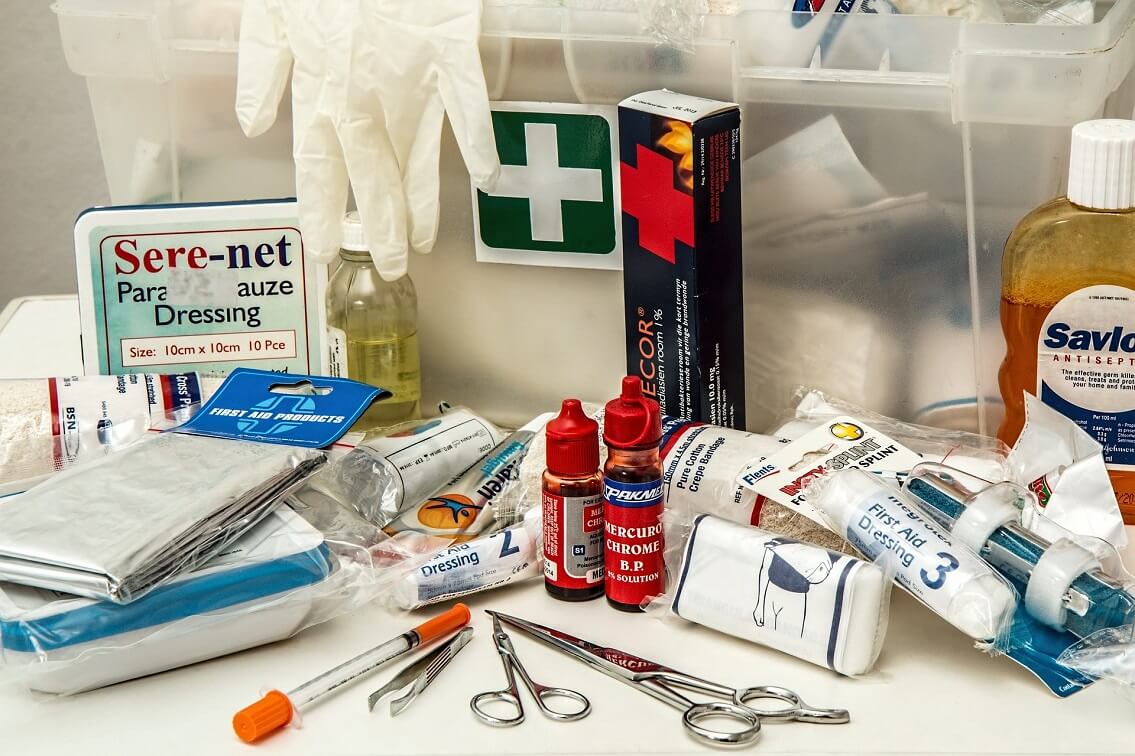First Aid & Corona - What you need to know

Not only on the streets, but also in private life, people may need your help. Unfortunately, even as it is, it is often overlooked and many people shy away from applying first aid measures - or don't even know what to do. In times of a pandemic, this topic is even more sensitive, because it is difficult to save lives with minimum distance and without physical contact. We have some tips for you so that you can act in an emergency and protect yourself as well as others in the best possible way. Even during the Corona crisis and the uncertainty of many, the following applies: If you are the first to arrive at the scene of an accident or see a person in distress, you must provide first aid.
Hygiene measures during first aid
Basically, hygiene is always one of the top priorities in such a measure. You can never know whether the person may be ill or what has led to their condition. That is why disposable gloves have long been part of the basic equipment of a first aid kit. Especially in times of minimum distances and contact restrictions, it is therefore enormously important to put the gloves on directly in an emergency.
Since the mouthguard is a daily companion nowadays and most people always carry one with them, you should definitely put it on in such a situation as well. It would be ideal if the injured person could also make use of it. Please do not put on a mask that you have brought with you and that may already be in use, but - if possible - use an unused mask or one that the person has brought with them.
Wash or disinfect your hands immediately after the procedure. It is therefore advisable to supplement your first aid kit (ideally also with a few disposable masks) and generally carry disinfectant with you.
Secure the accident site
In order not to put others and yourself in further danger in the event of an accident, there is a procedure for first aid which will give you peace of mind that you are not forgetting anything and is the least dangerous for all involved. First, equip yourself and any helpers with high-visibility waistcoats so that traffic can also see you without any problems. Then walk towards the traffic flowing in the same direction so that you can set up the warning triangle. There is a rule of thumb with the distances:
In towns about 50 metres, on country roads about 100 metres and on a motorway at least 150 metres from the scene of the accident, except in the case of bends, hills or mountains - Here the warning triangle must always be placed in front. Once the warning triangle is in place, ask road users to slow down and drive more carefully. This is usually done by extending one arm and making upward and downward movements to make it clear to other motorists what needs to be done. It is also advisable (depending on the situation of the accident) to ask other road users for assistance. They can, for example, warn oncoming traffic, continue to secure the accident site or make an emergency call. Throughout Europe, the emergency call is made via the number 112.
Only after you have secured the accident site or asked for assistance does the treatment of the injured person begin.
Treating the person
First, you must check whether the person is responsive and conscious. This can be checked quickly by speaking loudly and, if necessary, by nudging the shoulder area. If the person is conscious, take the expressed complaints seriously and pass them on to the paramedics as quickly as possible. If the person is not conscious, the breathing must be checked. In times of corona, it is not necessary to move to the immediate vicinity of the face in order to perceive breathing sounds or draughts. According to the "German Council for Resuscitation", breathing control can be limited to hyperextension of the neck with elevation of the chin and subsequent observation of any chest movements. If breathing is regular and normal, you can place the victim in the recovery position. If no breathing can be detected, you must start resuscitation - i.e. cardiac massage. Contrary to the fears of some, it was not mandatory to perform mouth-to-mouth or mouth-to-nose resuscitation even before the pandemic. Nevertheless, it is also to be expected of every person that he or she can perform continuous chest compressions until the arrival of the rescue forces.
Failure to help is punishable by law
It is important to emphasise once again at this point that not helping is also punishable. It is punishable by a fine or even imprisonment of up to one year under Section 323c of the Criminal Code. Thus, no one is helped if you look the other way. Of course, you do not have to put yourself in danger, but it is always possible to secure the scene of an accident and also to make an emergency call. It harms no one and is also reasonable in today's times. Help to save lives. You too may be dependent on the help of others. Refresh your knowledge of first aid measures from time to time, because you never know what to expect.
We wish you a safe and accident-free journey!



